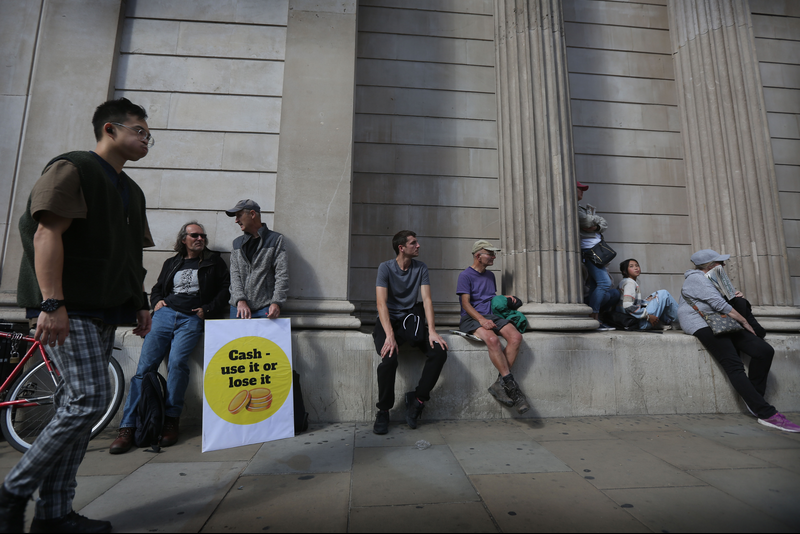Efforts to go cashless have been ramping up over the past few years, accelerated by the Covid pandemic. And a bigger transition is in discussion, that of central bank digital currencies (CBDCs).
As of late February 2024, no decision to adopt a digital pound has formally been made. But the the Bank of England and HM Treasury continue to debate the matter, after launching a consultation paper in 2023 that elicited over 51,000 responses.
Law firm Eversheds Sutherland says it “remains more likely than not that the UK will adopt a CBDC later this decade, and it is believed the design phase process alone will benefit Britain’s fintech and tech sectors.
Big Brother concerns
The Bank and HM Treasury acknowledge the importance of clearly articulating to the public why a digital pound might be necessary in the future, January’s response paper said. The Bank distinguished between anonymity and privacy, saying the latter would be protected by future laws on any digital pound that would guarantee users’ privacy and also guarantee that neither the Bank nor the Government would control how consumers spend their money.
According to the Bank’s design principles, user privacy and control would be guaranteed through:
- no access to personal data by the Bank and the Government through the Bank’s core infrastructure;
- privacy-preserving payment options;
- ensuring money is not programmed by the Bank or the Government.
“As CBDCs would be predominantly accessed through smartphones, people who often have poorer online access, including elderly … would be at disadvantage.”
Mark Johnson, Advocacy Manager, Big Brother Watch
But critics believe the state has no place involving itself with day-to-day payments. “A centralized digital currency would only add fuel to the fire in a financial system increasingly obsessed with excessive data collection,” Mark Johnson, Advocacy Manager, Big Brother Watch, told GRIP.
“A UK CBDC would place the state at the heart of all financial transactions and every transaction would be recordable. Such a centralized digital currency would likely combine identity information and transaction data, creating a wealth of sensitive personal information that could allow public authorities, private companies, or even bad actors to collect and link data to customer profiles en masse.”
But David Birch, author of The Currency Cold War, says most consumers using digital currency for standard day-to-day payments will neither know nor care whether they’re using CBDCs or not.
And he thinks total privacy in digital payments of any kind is urealistic. “People who advocate essentially unlimited anonymous electronic cash are, for want of a better word, naive. If you really could have unlimited amounts of electronic cash that you move around the world in complete secrecy and no one would know, that’s a world of warlords,” he says.
Currently there is an open request relating to the privacy aspects of the digital pound. It closes on March 12.
Financial inclusion
A poll in 2021 found mixed views, with 30% of people saying a CBDC is more likely to harmful than beneficial to the UK, and 24% saying it is more likely to be beneficial than harmful, while 46% say they don’t know.
Proponents of centralized digital currencies say that not only will they ease transactions and eliminate problems like double-spending, but lead to greater financial inclusion.
But there is public concern that low digital literacy among both the elderly and the disabled would cause difficulties with adapting to a new technology, challenges in understanding the differences between the digital pound and existing services, and poor understanding of the privacy features of the digital pound.
“Rather than promote financial inclusion in the UK, CBDCs would have the opposite effect,” says Johnson. “As CBDCs would be predominantly accessed through smartphones, people who often have poorer online access, including the elderly and those from already marginalized groups, would be at a disadvantage. This would only deepen existing financial divides. The creation of such a currency would likely exacerbate the ongoing removal of cash infrastructure, slowly stripping the public of access to a form of currency that many people continue to rely on daily.”
Power plays
The context is different around the world, with some countries having already launched CBDC pilot programs, among them Australia, India, China, and Sweden.
In the US, 18 senators “strongly support” crypto. But some politicians, even those who support crypto, are strongly anti-CBDC. Senator Ted Cruz backed a bill this week to ban CBDCs, saying: “The Biden administration salivates at the thought of infringing on our freedom and intruding on the privacy of citizens to surveil their personal spending habits”.
The EU has pushed ahead, announcing in October it was moving from the investigation to the preparation phase of a digital euro.
“If there was a fully functioning US digital dollar, which the US seems against at the moment, it’s obvious that this would increase American power,” Birch says. “If it was just about central banks, that would be one story. But digital currency is about companies – like Circle, Tether, Bitcoin, and Ether – as well as countries. That makes it fascinating and much harder to predict which way things are going.”


